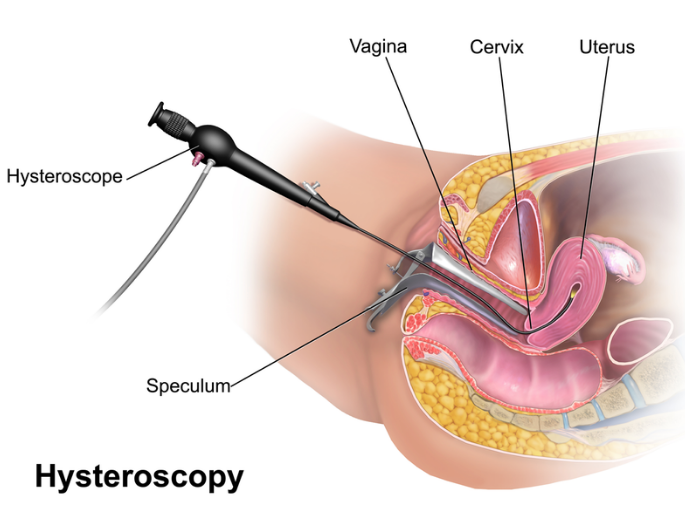Hysteroscopy in Czech Republic
Search and Compare the Best Clinics and Doctors at the Lowest Prices for Hysteroscopy in Czech Republic

Find the best clinics for Hysteroscopy in Czech Republic
No pricing info available
Morocco offers the best prices Worldwide
Price: $ 222
From 47 verified reviews
Miloslav Cerny, 20 September 2020
Stada dobra Bulovka... kdo tam nebyl o hodne prisel.
- Home
- Czech Republic
WHY US?
At Medijump, we're making medical easy. You can search, compare, discuss, and book your medical all in one place. We open the door to the best medical providers worldwide, saving you time and energy along the way, and it's all for FREE, no hidden fees, and no price markups guaranteed. So what are you waiting for?

Free

Best Price

Widest Selection

Risk-Free
What you need to know about Hysteroscopy in Czech Republic

Hysteroscopy is a procedure that allows a doctor to examine the inside of a woman’s cervix and uterus in order to diagnose and treat issues, such as pelvic pain, difficulty getting pregnant and abnormal bleeding. It is performed using a thin and flexible tube with a camera and a light at the end called a hysteroscope, which will send an image to a monitor so your doctor can get an up-close look inside your cervix and uterus.
What does a Hysteroscopy Procedure Involve?
Hysteroscopy can be performed under local anaesthetic and sedative, but it can also be done under general anaesthetic. Medication or tools called dilators are used to help open your cervix to allow the hysteroscope to be inserted. Then, a liquid solution or carbon dioxide gas is inserted through the hysteroscope into the uterus to clear away any blood or mucus and expand it, which will give your doctor a clear view of its lining. If surgery needs to be performed, the surgeon may do it during the procedure using tiny surgical instruments that are inserted through the hysteroscope.
How Long Should I Stay in Czech Republic for a Hysteroscopy Procedure?
You may be able to leave the hospital several hours after the procedure. However, it is recommended to stay in Czech Republic for around 2 to 3 days, especially if you had treatment during the procedure or if you received general anaesthetic as you will need to allow your body to rest for several days.
What's the Recovery Time for Hysteroscopy Procedures in Czech Republic?
Most women are able to get back to work as well as their normal activities the day after the procedure. But, you may want to rest for a few days if a general anaesthetic was used or treatment was performed during your hysteroscopy. Note that you need to avoid sex for around 2 weeks after the procedure.
What sort of Aftercare is Required for Hysteroscopy Procedures in Czech Republic?
You may experience cramping and bleeding, but you can take pain medication and wear pads to deal with this. If the result of your hysteroscopy shows any disease or abnormalities, you may want to schedule a follow-up appointment with your doctor in Czech Republic or with your local doctor at home to discuss a treatment plan.
What's the Success Rate of Hysteroscopy Procedures in Czech Republic?
Hysteroscopy is a highly successful and effective procedure to examine your uterus and cervix. Nonetheless, there is still a small chance that the result is inaccurate, but it is very rare. Also, there are some side effects and complications to be aware of, including infection, tearing or damage to the cervix, damage to nearby organs, pelvic inflammatory disease, problems with gas or fluid from the uterus, and problems with the anaesthetic.
Are there Alternatives to Hysteroscopy Procedures in Czech Republic?
The alternatives to hysteroscopy are pelvic ultrasound and endometrial biopsy. These procedures can be performed alongside a hysteroscopy, but they do not provide as much information as a hysteroscopy.
What Should You Expect Before and After the Procedure
Before hysteroscopy, you may have an unknown condition in your uterus or cervix, which may be dangerous and life-threatening. After the procedure, you will find out what is causing the symptoms and you can discuss with your doctor the best treatment plan.
Whilst the information presented here has been accurately sourced and verified by a medical professional for its accuracy, it is still advised to consult with your doctor before pursuing a medical treatment at one of the listed medical providers
No Time?
Tell us what you're looking for and we'll reachout to the top clinics all at once
Enquire Now

Popular Procedures in Czech Republic
Prices Start From $106

Prices Start From $131

Prices Start From $47

Recommended Medical Centers in Czech Republic for Hysteroscopy

- Interpreter services
- Translation service
- Religious facilities
- Medical records transfer
- Medical travel insurance
- Health insurance coordination
- TV in the room
- Safe in the room
- Phone in the room
- Private rooms for patients available

- Interpreter services
- Translation service
- Religious facilities
- Medical records transfer
- Medical travel insurance
- Health insurance coordination
- TV in the room
- Safe in the room
- Phone in the room
- Private rooms for patients available

- Interpreter services
- Translation service
- Religious facilities
- Medical records transfer
- Medical travel insurance
- Health insurance coordination
- TV in the room
- Safe in the room
- Phone in the room
- Private rooms for patients available

- Interpreter services
- Translation service
- Religious facilities
- Medical records transfer
- Medical travel insurance
- Health insurance coordination
- TV in the room
- Safe in the room
- Phone in the room
- Private rooms for patients available

- Interpreter services
- Translation service
- Religious facilities
- Medical records transfer
- Medical travel insurance
- Health insurance coordination
- TV in the room
- Safe in the room
- Phone in the room
- Private rooms for patients available

- Interpreter services
- Translation service
- Religious facilities
- Medical records transfer
- Medical travel insurance
- Health insurance coordination
- TV in the room
- Safe in the room
- Phone in the room
- Private rooms for patients available
Hysteroscopy in and around Czech Republic
The Czech Republic is a landlocked country in Central Europe and it has a rich and eventful history, as well as amazing attractions. From medieval towns and magnificent castles to picturesque national parks and relaxing spa resorts, it has a lot to offer. The country also boasts top-quality healthcare and is emerging as a popular medical tourism destination. Medical procedures in the country are performed with the latest technology and techniques. The medical professionals are highly qualified, well trained, and internationally recognized. Besides, the cost of medical procedures in the country is extremely competitive. Medical tourists can make significant savings compared to most other countries in Europe. Cosmetic surgery is particularly popular among international medical tourists.
Popular Parts of Czech Republic
Prague is the capital and is popular for its fine dining, eccentric nightlife, and wonderfully preserved medieval buildings with Gothic architecture, such as Prague Castle, the 14th-century Charles Bridge, and the Astronomical Clock. Along with Prague, Ceský Krumlov and Brno are frequently visited by tourists as well.
Weather and Climate in the Czech Republic
Due to its location, the Czech Republic has a mostly temperate climate. Extreme weather is rare, but the summers can get hot and the winters cold. Summer starts in June and the days can be scorching hot. The average temperature is around 26°C, but in recent years, it tends to rise to 37°C. Winter, from November to March, can get rather cold. The average temperatures drop to around 2°C during the day and -2°C at night, with some snowfall and rain. Spring (March-May) and autumn (September – October) have beautiful weather.
Getting around in the Czech Republic
Václav Havel Airport Prague is the main airport where international visitors fly into and out of the Czech Republic. It serves numerous flights to many cities around Europe and Asia, including London, Moscow, Dubai, and Seoul. The Czech Republic has an affordable and reliable public transport system. Domestic flights are available, but rarely necessary. The rail network is affordable and very comprehensive, covering almost every city and town in the county. The bus also has extensive coverage throughout the country. Public transport within cities is also excellent. In major cities, you can opt for the metro, tram, bus, or trolleybuses. Taxis are widely available and are metered, but the fares are higher at night.
Tourist Visas in the Czech Republic
Nationals of all EU countries do not need a visa to visit and stay in the Czech Republic. The country is a part of the Schengen area, which means citizens of around 62 countries can stay for up to 90 days without a visa. These visa-exempt countries include Australia, Canada, the US, and South Korea. Citizens of other countries are required to apply for a visa before visiting the country. Those who want to receive medical care should obtain a Czech Republic Visa for Medical Purposes.
Additional Information
- Local Currency: Czech Koruna/Czech Crown (CZK) is the currency of the Czech Republic. 1 USD is equivalent to 22.98 CZK. Note that the euro is not widely accepted in the country.
- Money & Payments: ATMs are widespread around the Czech Republic. Major credit cards, such as MasterCard and Visa, are accepted for many types of transactions, but you may need to pay in cash for smaller amounts. Tipping is expected, especially in restaurants. Tip at least 10% of the bill.
- Local Language: The official and most commonly spoken language is Czech, but Slovak is widely spoken as well. Many people, particularly in major cities, can speak English and German.
- Local Culture and Religion: Most of the population is religiously unaffiliated and does not believe in God. However, Christianity is the largest religion. Judaism, Islam, Buddhism, and Paganism are also practiced by a small percentage of the population.
- Public holidays: New Year’s Day, Easter Monday, Liberation Day, Sts Cyril & Methodius Day, Jan Hus Day, Republic Day, and Czech Statehood Day are some of the most important public holidays in the Czech Republic.
Popular Searches
- Plastic Surgery in Thailand
- Dental Implants in Thailand
- Hair Transplant in Thailand
- Breast Augmentation Thailand
- Gastric Sleeve in Thailand
- Gender Reassignment Surgery in Thailand
- Laser Hair Removal in Bangkok
- Botox in Bangkok
- Dermatology in Bangkok
- Breast Augmentation in Bangkok
- Coolsculpting in Bangkok
- Veneers in Turkey
- Hair Transplant in Turkey
- Rhinoplasty in Turkey
- Stem Cell Therapy in Mexico
- Rhinoplasty in Mexico
- Liposuction in Mexico
- Coolsculpting in Tijuana
- Rhinoplasty in Korea
- Scar Removal in Korea
- Gastric Sleeve in Turkey
- Bone Marrow Transplant in India
- Invisalign in Malaysia
- Plastic Surgery in the Dominican Republic
- Tummy Tuck in the Dominican Republic
- Plastic and Cosmetic Surgery in Poland
- Rhinoplasty in Poland
- Hair Implant in Poland
- Dental Implants in Poland
- IVF in Turkey
